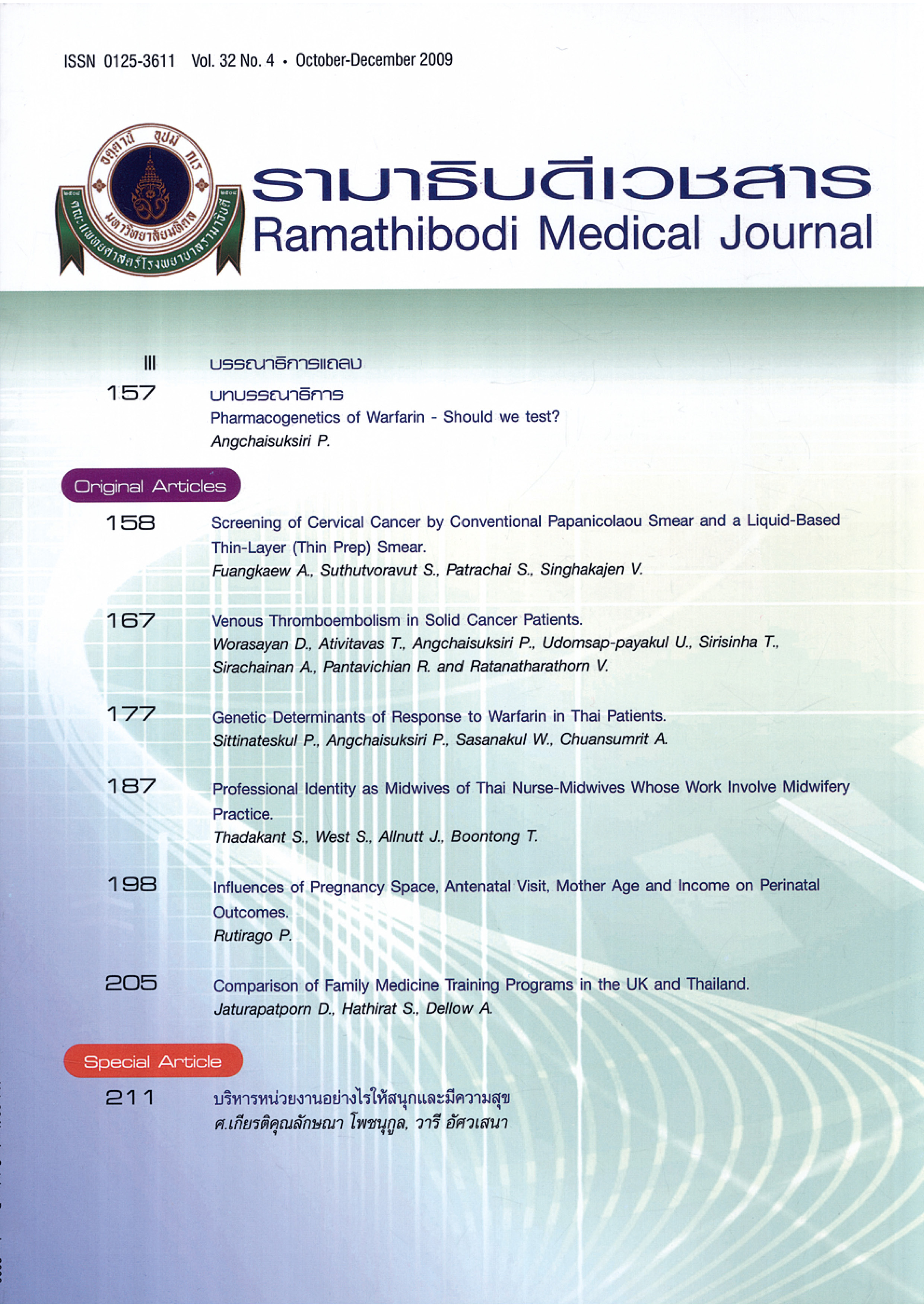Professional Identity as Midwives of Thai Nurse-Midwives Whose Work Involve Midwifery Practice
Keywords:
Midwives, Thai nurse-midwivesAbstract
Midwifery in Thailand has long been established, and midwifery practice has been provided in five health care setting levels (primary to tertiary). In this country every registered nurse also becomes a licensed midwife at initial registration.
In the current research of exploring current midwifery practice in Thailand, the randomly selected samples comprised 3,030 nurse-midwives whose work involve with pregnancy care in all levels of health settings across the country. In the study the questionnaire was used as a tool to collect data of demographic data and midwifery practice of nurse-midwives providing to pregnant women. One of interesting findings revealed that only 44 (1.5%) of 1,511 respondents (50%) identified themselves as midwives. Almost of the respondents identified themselves as obstetric nurses.
This less identification of a midwife is of great interest as all respondents are those who work with pregnant women. In terms of midwifery profession, it is accepted that once one graduates and receives a midwifery license, and provides care for pregnant women should be called “a midwife”. Not identifying as a midwife simply implies that midwifery profession in Thailand is standing in a week position. To develop midwifery profession, it seems essential that the professional members must firstly recognize their own professional identity by claiming themselves as a midwife. However, before implementation of developing strategies, it is important that respondents' perceptions on the term they prefer and do not prefer to be called are explored.
The purpose of this paper is to present the further findings of how the respondents feel about the terms “midwife”, “professional nurse”, “nurse- midwife”, and why they identified/not identify themselves as midwives though they work with pregnant women.
The widely scattered locations of the volunteers resulted in a difficulty in forming the planned discussion groups as the anticipated number of participants (four to six) could not be achieved due to the location of the participants. Therefore, individually interviews were conducted in the areas. Differences in environment and approaches might have affected the responses of participants and could affect the findings.
References
Thailand Nursing and Midwifery Council. The Professional Nursing and Midwifery Act B.E. 2528 (1985). Available from: https://thailawonline.com/en/thai-laws/laws-of-thailand/287-the-professional-nursing-and-midwifery-act-be-2528-1985.
International Confederation of Midwives. Professional Accountability of the Midwife, 1999. Available from: http://www.internationalmidwives.org.
World Health Organization, Regional Office for South-East Asia. Standards of Midwifery Practice for Safe Motherhood. Geneva: WHO Regional Office for South-East Asia.1997.
Secrest JA, Norwood BR, Keatley VM. "I was actually a nurse": the meaning of professionalism for baccalaureate nursing students. J Nurs Educ. 2003;42(2):77-82.
Fagermoen MS. Professional identity: values embedded in meaningful nursing practice. J Adv Nurs. 1997;25(3):434-441. doi:10.1046/j.1365-2648.1997.1997025434.x.
Ohlén J, Segesten K. The professional identity of the nurse: concept analysis and development. J Adv Nurs. 1998;28(4):720-727. doi:10.1046/j.1365-2648.1998.00704.x.
Gregg MF, Magilvy JK. Professional identity of Japanese nurses: bonding into nursing. Nurs Health Sci. 2001;3(1):47-55. doi:10.1046/j.1442-2018.2001.00070.x.
Beeman PB. Nursing education, practice, and professional identity: a transcultural course in England. J Nurs Educ. 1991;30(2):63-68.
Roberts SJ. Development of a positive professional identity: liberating oneself from the oppressor within. ANS Adv Nurs Sci. 2000;22(4):71-82. doi:10.1097/00012272-200006000-00007.













